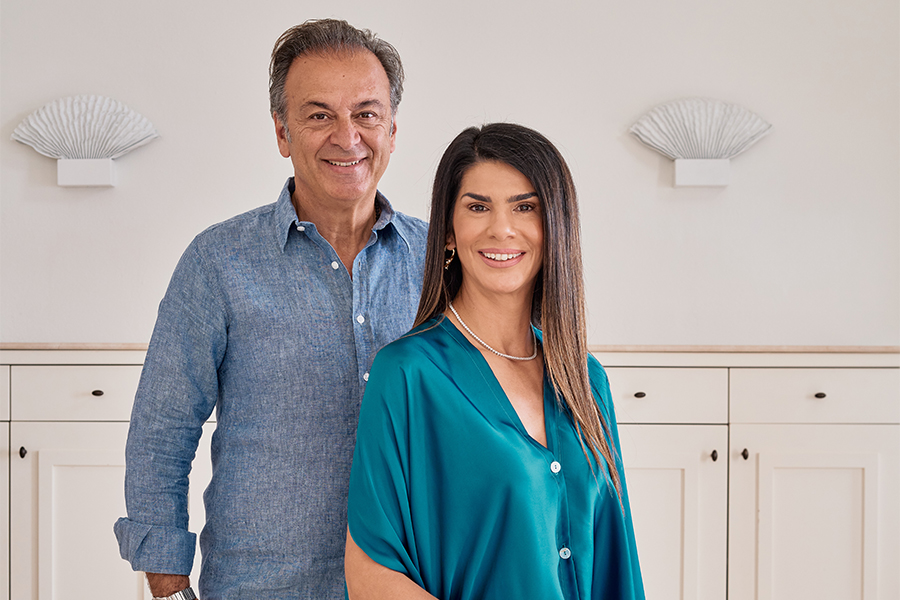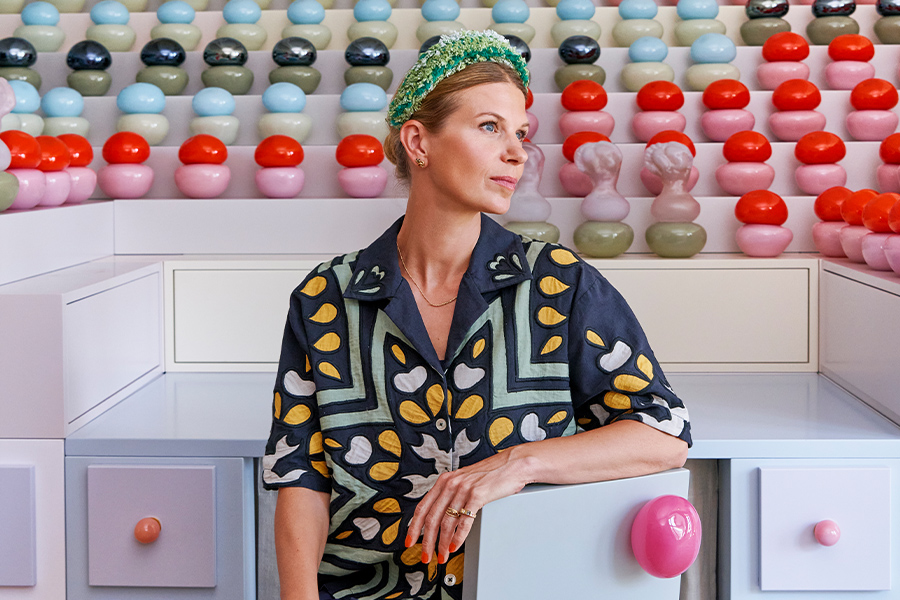In the most recent installment of HD’s Meet the Minds series, David Shema of Pasadena-based Shema Dougall Design Associates shares how architecture has long influenced his outlook, as well as how he continues to perpetuate the legacy of his mentor, Terry Dougall.
Where did you grow up? Did it influence your career path?
My parents divorced when I was a baby. I lived with my mother and brother in Chichester but we spent a lot of time with our father in London too. Dad would show us all the sights and throw a lot of fun parties; with mum, it was much more grounded and outdoorsy. I spent a lot of time sailing and at the beach. I definitely still crave that mix of country and city in order to be inspired and I don’t think it’s a coincidence that my studio has ended up being a really good fit for country-house hotel projects that we can inject a bit of city style into.
What are some of your first memories of design?
Our dad would take us out to amazing restaurants from a young age. I remember finding it all very exciting and glamorous. We used to go to such a mix of places: a very cool pizza restaurant in Covent Garden called Grunts, where you could eat off a Pac-Man table; the Hard Rock Café; hidden family-run Italians; and the Savoy or Mosimann’s for special birthdays. I was probably far too young for it all but I remember just taking in the surroundings and all the lovely design details. I definitely learned to appreciate the theatre of going out, and I realised the relationship between design and creating an emotionally stimulating atmosphere from early on.
Give us a bit of your background: college, first jobs, early lessons learned.
I went to Northbrook Art College in Worthing for two years before taking a degree in Fashion Promotion and Illustration at the Surrey Institute of Art & Design. My great friend Gemma and I made a mini pilot for a new fashion TV show which we exhibited at London Graduate Fashion Week on the South Bank. A TV executive from Anglia TV spotted our work and asked us to be runners on a new fashion programme they were producing. I decided to go for it and moved to Cromer with an old auntie, whom I didn’t know, so I could commute to Norwich every day. Weekends were spent birdwatching and drinking gin with my aunt who was lovely. It was quite surreal for a 21-year-old. The job was hard work and I think I made £50 a week. When it ended, I moved to London and started working at the BBC on another fashion show called Looking Good, before realising I wanted to work on the interior-design shows that were being produced in the same building. I used to smile at the producer of Home Front in the lift and bought her a cup of coffee once – that’s how I got a job on that show! I loved it. I was a researcher then and worked closely with the designers. We used to make over people’s houses – it was my job to organise the shoots but what I really wanted to be doing was the interior design.
I spent about 10 years in TV and worked my way up to producing and directing but my heart just wasn’t in it anymore. I was starting to work on some rather questionable weight-loss shows and realised I needed to get out of that game. My brother was also living in London at the time. He had an events company and was running big club nights so I used to work with him in between TV gigs. We worked closely together when he opened a bar called ‘The White House’ in Clapham. I helped him with the design and the launch. He loves interiors too so that was great fun. When he (James Lohan) went on to start the boutique travel company Mr & Mrs Smith with his now-wife Tamara, I took over his events company and started to produce very big, theatrical events for a mixture of clients.
I was living in Queen’s Park in North London by this point and had an office next to the Interior Design School. I used to walk past and look in. I just couldn’t shake the feeling that I wanted to be in there. I decided to do a part-time course and loved it so much I took a year out to study interior design. I continued running events afterwards, alongside some small styling jobs. Through James, I was lucky to get some good introductions to hoteliers and my portfolio grew steadily. From styling the Ampersand Hotel in South Kensington and Foxhill Manor in the Cotswolds, I went on to design a budget boutique hotel – the Fish – for Farncombe Estate (the same family as Foxhill Manor and Dormy House). My career path has scarcely been conventional, but I can clearly see the impact of all my experiences to date in the work I do today.
When did you launch Hannah Lohan Interiors? What led you to create your firm?
After having spent years running the events company, I don’t think I could have gone back to working for anyone else. My father ran a PR company for years and James has always had his own business too, so I think it’s just in our blood. I set up my interior-design business officially in 2015 and haven’t looked back. I’d always had that niggling feeling that I should have been doing this, and I was right – I absolutely love designing for the hospitality sector.
What sets your firm apart from others?
Our focus is on about storytelling with design, and thinking of creative, fun details that enrich the space. We like to help clients with every touch point, from the crockery to the staff uniforms and, whatever the brief, we always think about the extras that might enhance the experience – perhaps safari tents in the grounds, or a pop-up bar in an old horse wagon. For me, it’s about theatre and fun. We make sure we’ve thought through the guest journey from the moment they arrive to ensure their experience is as rich and memorable as possible throughout their stay.
How would you describe your firm’s aesthetic? Can you discuss/describe some of your recent hospitality projects?
Every project we do is different, depending on the brief and the story we’re trying to tell. That said, we do love to mix vintage pieces into our designs, as this helps develop a narrative and add depth and character to a scheme. We’ve built up so many great vintage suppliers over the years that we decided to start a little shop in The Old Cinema in Chiswick, West London, where we sell some of the pieces we’ve found on our travels.
Our work on the Dunstane Houses hotel in Edinburgh, for example, is very opulent, celebrating the lavish Victorian architecture and the owners’ glamorous personal style. You’ll see lots of bold wallpapers, copper bath tubs and Persian rugs. We have a completely different style at Hook restaurant in the Cotswolds: a Scandinavian-influenced hygge-inspired look, with natural, calming tones, cosy patterns and a stunning 360º central fireplace. It also has a mixture of different seating, Crittall-style glazing that breaks up the large open space and a fantastic theatre kitchen that really gives the place a buzzy atmosphere. We’re now working on a very exciting project in a village called Woolsery in North Devon. Our clients, Bebo founders Michael and Xochi Birch have bought several properties, including the manor house, several holiday cottages, the neighbouring farm and the pub, the Farmers Arms, which is now open and doing really well.
Which architect or designer do you admire most?
I really admire Robin Standefer and her husband Stephen Alesch, the founders of Roman And Williams in New York. Their background is in film. They designed incredible sets together for movies including Practical Magic and Zoolander and went on to create beautiful hotels such as the Viceroy and Ace Hotel in New York. They have a very cool shop called RW Guild which I’m obsessed with and planning to visit as soon as we can travel again. I might go and do a pilgrimage to all their hotels as well. Do I sound like a stalker?
What is your dream project?
The Woolsery project is actually our dream one! We don’t get to see Michael and Xochi much as they’re based in San Francisco but their good friend and managing director Emily Harmon is our main contact and she’s brilliant. She’s so creative and into design and also knows what Michael and Xochi like as she’s been through several builds with them in the States, including their own home in Pacific Heights and their hotel and members’ bar the Battery, both designed by the incredible Ken Fulk. They all love very dramatic, bold design so it’s a dream for us as they’re so open to creative ideas.
If you could have dinner with anyone, living or dead, who would it be? Where would you eat and what would you be having?
I’d love to meet Ken Fulk in person and chat about his work and inspiration. He designed Swan restaurant in Miami for Pharrell Williams so that would be a good place to meet. All the food looks amazing but I’d definitely be trying the cocktail menu first: it would have to be the Miami’s Vice: vodka, amaretto, grapefruit and lemon – delicious!
If you weren’t in your current career, what would you be doing?
I thought about going in to set design or even being an actress when I was younger. Drama, art and creative writing were the only things at school I loved and was any good at. Whatever I did, it would have to involve storytelling in one way or another.


